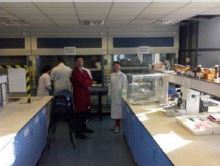January 26, 2016, by Editor
Pharmacy School Research Blog Aug-Oct 2015
Welcome to our latest edition of the Pharmacy School Research Blog, highlighting the exciting and innovative research carried out in the School. You can read more about our recent research activities in the School of Pharmacy Journal Aug-Oct 2015
Professor Phil Williams, Director of Research
Revealed: Helicobacter pylori’s secret weapon
Discovered in 1982, Helicobacter pylori (H. pylori) is a disease-causing bacterium that survives in our stomachs despite the harsh acidic conditions. It is estimated that one in two people have got it, though most won’t ever experience any problems. Even so, it is considered one of the most common bacterial infections worldwide and a leading cause of dyspepsia, peptic ulceration and gastric cancer. Through unique evolutionary adaptations, H. pylori is able to evade the antiseptic effect of our stomach acid by hiding within the thick acid-resistant layer of mucus that coats the stomach wall. Once within the mucus layer, the bacterium latches onto sugars naturally found on the stomach wall using its adhesion proteins. This attachment is so effective that the bacterium can resist attempts by the body to ‘flush’ it away, allowing the pathogen to colonise with impunity.
But the game could be up for H. pylori. Researchers in the School of Pharmacy at The University of Nottingham and AstraZeneca R&D have identified the molecular mechanism that the bacterium’s best-known adhesion protein uses to attach to stomach sugars. The research was published on August 14 2015, in the prestigious scientific journal Science Advances (2015) 1, e1500315 DOI: 10.1126/sciadv.1500315
Powerful x-rays reveal special ‘groove’
Naim Hage, who worked on this project as part of his doctoral thesis, said: “Although it’s still very early, the insight we’ve gained from this study is already very exciting news for patients.” Using extremely powerful x-rays, the scientists were able to study the interactions between the H. pylori adhesion protein BabA and Lewisb sugars of the gastric mucosa at the atomic level. They found that right at its tip, BabA possesses a specific groove that enables it to securely attach to Lewisb using a network of hydrogen bonds (the same kind of interactions that keep water molecules together).
The principal investigator behind the project, Dr Franco Falcone, said: “While this study answers long-standing questions about how H. pylori colonises the stomach, it represents the very first step in the development of novel therapies. The next few years of laboratory-based research will be crucial to determine if an anti-BabA adhesion approach is viable and can progress to clinical development. A similar approach is already showing promising results for the treatment of urinary tract infections in preclinical models. Looking forward, we are excited to continue working closely with AstraZeneca R&D who have provided a tremendous amount of support to achieve this discovery.”
Student success at the RPS conference 2015
Students from the Nottingham School of Pharmacy did exceptionally well at this year’s Royal Pharmaceutical Society (RPS) conference held at the ICC Birmingham. Meera Vara’s research poster entitled “Perceptions and Experiences of Women Who Have Ever Stopped Taking Aromatase Inhibitors” took the prize for best poster in the Practice Research section. The poster “Evaluation of community pharmacy customers’ views of the seasonal influenza vaccination and community pharmacy vaccine service” by Sui Tan and Yuen Man was also highly commended in the same section.
MPharm research project delivers real life drug discovery experience
Students in the School of Pharmacy now have the opportunity to participate in a real life experience of the drug discovery process thanks to an innovative new project supported by academics from the Division of Medicinal Chemistry and Structural Biology and the pharmaceutical company, GlaxoSmithKline (GSK). Working in teams, 24 students from the MPharm undergraduate programme established virtual drug discovery companies where they designed and synthesised new chemical compounds as potential drugs to treat asthma. Responsible for devising their own work programmes and balancing budgets, the resulting compounds were tested against an important biological target by scientists at GSK, feeding back valuable data to enable the teams to further refine their potential as future asthma drugs. The success of the project means that it will be extended to students on the MSc in Drug Discovery and Pharmaceutical Sciences. This builds on the successful GSK-sponsored programme in the School of Chemistry (led by Dr Jonathan Fray under the sponsorship of Professor Chris Moody) which generated the starting materials for the School of Pharmacy students to work with. Special thanks are extended to our colleagues at GSK (Dr Simon Macdonald and James Rowedder) who also arranged an entertaining afternoon of introductory lectures and workshops demonstrating the benefits of team working for successful project delivery. The project leader, Dr Michael Stocks said “This is an innovative approach to running undergraduate projects; giving students a feel for both drug discovery and project management and it is hoped that this project will evolve in future years to generate first-class data that is fit for scientific publication”




The real life drug discovery experience is of great significance. It can provide student with a recognition of the difference between theory and practice.